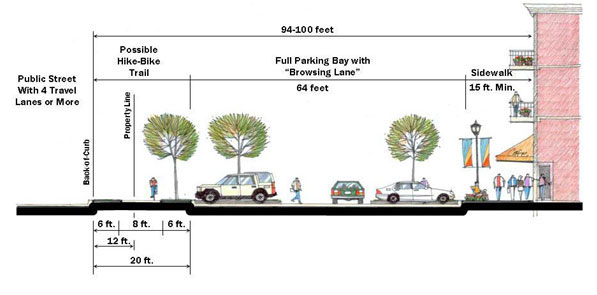Driven by New Urbanism, more than two dozen communities in the U.S. have loosened zoning restrictions in recent years. Cities are opting to use form-based codes, a concept less concerned with the use of buildings and more with their appearance and the way they relate to each other.
The goal of city planners is to shape the streetscape according to a vision for a neighborhood. The new approach has been called “performance-based zoning.” An example is a large development in Fremont, Calif., where the city council changed its approach to zoning on a nearly 900-acre development adjacent to a light rail station.
Planners started with several goals—a certain number of jobs, a certain number of homes including affordable homes, and strict standards for a low carbon footprint. The developers were allowed to design the project as they saw fit as long as they could achieve those goals.
The performance-based approach is contrary to the principle of separation of uses that led to color-coded zoning maps pinned up in most town halls. According to the old philosophy, ach zone had its own designated use: residential, commercial, or industrial. This method is increasingly seen as inappropriate for urban development—especially infill, downtown, and transit-oriented projects.
(http://www.citylab.com/housing/2014/08/braving-the-new-world-of-performance-based-zoning/375926/)
Related Stories
Market Data | Nov 27, 2023
Number of employees returning to the office varies significantly by city
While the return-to-the-office trend is felt across the country, the percentage of employees moving back to their offices varies significantly according to geography, according to Eptura’s Q3 Workplace Index.
Codes and Standards | Nov 27, 2023
Hoboken, N.J.’s street design policies are saving lives
Transportation policies enacted in Hoboken, N.J. over the past several years are paying off in the form of fewer pedestrian deaths and injuries. The city has adopted daylighting, bike lanes, lower speed limits, and intersection redesigns to make its roads safer.
Resiliency | Nov 27, 2023
All levels of government need to act to cope with climate-driven flooding and sea level rise
The latest National Climate Assessment highlights the need for local, state, and federal governments to adopt policies to mitigate the effects of climate-driven flooding and sea level rise, according to a policy expert with the National Resources Defense Council.
MFPRO+ News | Nov 21, 2023
California building electrification laws could prompt more evictions and rent increases
California laws requiring apartment owners to ditch appliances that use fossil fuels could prompt more evictions and rent increases in the state, according to a report from the nonprofit Strategic Actions for a Just Economy. The law could spur more evictions if landlords undertake major renovations to comply with the electrification rule.
Codes and Standards | Nov 21, 2023
Austin becomes largest U.S. city to waive minimum parking requirements
Austin, Texas recently became the largest city in the United States to stop requiring new developments to set a minimum amount of parking. The Austin City Council voted 8-2 earlier this month to eliminate parking requirements in an effort to fight climate change and spur more housing construction as Texas’s capitol grapples with a housing affordability crisis.
Codes and Standards | Nov 10, 2023
Washington state building codes to protect structures from wildfire provoke controversy
New building codes in Washington state intended to protect structures from wildfires are provoking backlash from builders, cities, and environmentalists. Critics charge that the rules that are scheduled to take effect March 15 are confusing, will increase housing costs, and could cause too many trees to be cut down.
Sustainability | Nov 1, 2023
Researchers create building air leakage detection system using a camera in real time
Researchers at the U.S. Department of Energy’s Oak Ridge National Laboratory have developed a system that uses a camera to detect air leakage from buildings in real time.
MFPRO+ News | Nov 1, 2023
Washington, D.C., Queens, N.Y., lead nation in number of new apartments by zip code
A study of new apartment construction by zip code showed Washington D.C., and the Queens borough of New York City are the hottest multifamily markets since 2018, according to RentCafe.
Adaptive Reuse | Nov 1, 2023
Biden Administration reveals plan to spur more office-to-residential conversions
The Biden Administration recently announced plans to encourage more office buildings to be converted to residential use. The plan includes using federal money to lend to developers for conversion projects and selling government property that is suitable for conversions.
Sustainability | Nov 1, 2023
Tool identifies financial incentives for decarbonizing heavy industry, transportation projects
Rocky Mountain Institute (RMI) has released a tool to identify financial incentives to help developers, industrial companies, and investors find financial incentives for heavy industry and transport projects.

















